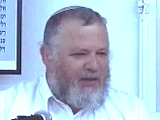- Torah Portion and Tanach
- Shmot
The Torah study is dedicatedin the memory of
simha bat hana
467
Moshe turned to Hashem, as a response to the command that he lead Bnei Yisrael out of Egypt, saying: "I am not a man of words, not from yesterday, not from two days ago, not from the time that You spoke to Your servant" (Shemot 3:10). With all of the Divine Help he was promised, why did Moshe doubt that he would be successful in his mission? Also, why does Moshe stress "not from yesterday, not from two days ago"? Wasn’t the phrase, "from the time that You spoke to Your servant" sufficient?
We have to understand that the task of carrying out the Exodus was a difficult and complex one that took time and had different elements to accomplish. One "station" had to be reached before one could go on to the next. The first element was to convince Bnei Yisrael that the time had come for them to go free. The second was to convince Paroh that he should or would have to let them go. Along with him, Aharon and the elders were supposed to play roles, but that was not always easy, either. We see that the elders accompanied Moshe when he talked with Bnei Yisrael, but when it came to confronting Paroh, their absence is conspicuous, and Chazal, cited by Rashi, deal with the consequences of their failure.
In the aftermath of the apparently failed demand of Paroh that he let Bnei Yisrael go, there were painful consequences. Paroh increased the amount of work that they were required to do. Although they no longer received the straw with which to make bricks, they were required to produce the same amount of bricks that they did "from yesterday and two days ago" (Shemot 5:7). This phrase is repeated in this context three times, stressing its centrality to the episode. When we return back to the story of the burning bush and Moshe’s reservations about his ability to succeed, we now can understand it better. Moshe turned to Hashem and stressed to him that the "yesterday and two days ago" is the proof that he was not being successful. Those key words were the evidence that since he started his mission, things had only gotten worse. From that point, Hashem had to assure him that despite the apparent failures, He would ensure that Moshe would indeed succeed at liberating Bnei Yisrael.

Rabbi Yossef Carmel
Head of "Eretz Hemda" Dayanut Kollel

Rabbi Pinchas ben Yair Said: “Purity Leads to Sanctity”
5771

Did Paroh and the Egyptians Do Teshuva?
Shvat 1 5782

The Two Countings of the Nation, Yom Haatzmaut and Yom Yerushalayim
Iyar 26 5777

Where Did the Troubles Start?
Parashat Vayeshev
5764

Understanding the Shalom Zachor
Rabbi Avraham Rosenthal | Cheshvan 12 5780

Why is Hafrashat Challah So Important
Rabbi Yosef Tzvi Rimon | 5778

Parshat Shemini
The Mishkan: Dedication, Anticipation, and Crisis
Rabbi Hillel Geffen | Nisan 5761

What Will the Neighbors Think?
The laws of Marit Ayim
Rabbi Yirmiyohu Kaganoff | Thursday, 27 Cheshvan 5768
Daf Yomi Makkot Daf 7
R' Eli Stefansky | 17 Nisan 5785

The Solution to 'Risky' Intellectual Topics
Ayn Aya, Shabbat v, 72
Rabbi Ari Shvat | Nisan 5785









